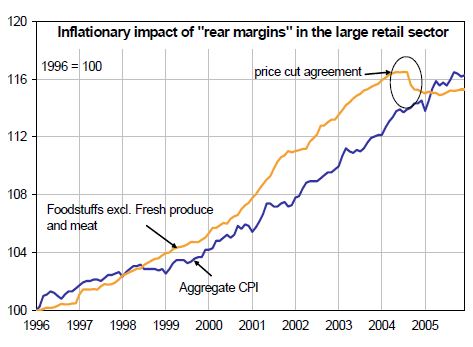Trésor-Economics No. 3 - Business relationships between suppliers and retailers
Relationships between retailers and suppliers are generally non-integrated and vertical, involving a complex blend of cooperation and competition. In the large retail sector, the balance of power has been tilted in the large retailers’ favour over the last few years. This asymmetry is liable to breed market inefficiencies and anti-competitive effects. What is more, it is sometimes suspected by suppliers and small retail representatives of allowing large retailers to behave in a «predatory» fashion. This in turn sometimes feeds demands of some protective measures, in the name of the most vulnerable of these.
The French authorities have long sought to regulate these relationships. They have notably done so by strengthening the ban on selling below cost, with the passage of the so-called «Galland» Act of 1 July 1996. However, this step also resulted in less competition among retailers and among suppliers of national branded products, while «rear margins» (off-invoice discounts paid by suppliers to retailers, theoretically in return for services provided by the latter) rose; eventually, prices paid by the consumer rose durably.
The government responded to this by instigating an agreement between suppliers and retailers to reduce prices, signed in June 2004. Following that, the 2 August 2005 Act in aid of SMEs reformed the Galland Act in order to encourage suppliers and retailers to cut prices. The act gives more formal status to the annual negotiations between suppliers and retailers with a view to preventing abuse of «rear margins», and introducing a new method for calculating the threshold definition of selling below cost, thereby giving retailers greater latitude to cut their prices with effect from 2006. The impact of this policy is already perceptible, but it will take time to produce its full effects as resulting competition sharpens.
